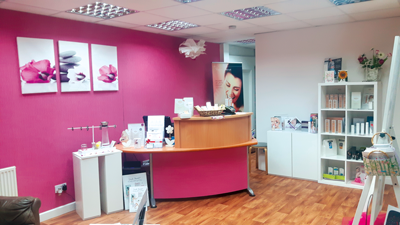An experienced nurse shares her tips and advice for launching an independent private aesthetic clinic.

LoveSkin Clinic opened its doors in November 2016. Like so many other nurses embarking on such a venture I had no experience running a business but a huge passion to make this work. Needless to say, I learned many valuable lessons on how a clinic can be run better and more cost-effectively, along the way.
In this article I am going to tell you how I got to where I am today and hope to share some useful insights with you.
What to call your clinic?
I spent a long time wondering what name to give my clinic, looking at other clinic names, saying the names I came up with out loud or looking at them in writing. After several weeks and running different names, fonts and colour designs past family and friends, I was still no further in deciding on what to call my venture. In the end I sat back and asked myself why I am starting this business and my answer was because I love skin. The name loveSkin clinic was born.
What about training?
Training companies are simply a jungle and you can end up spending a lot of money on your initial training and further courses. I spent nearly £3000 on a course and when I passed after four days, I was horrified. Why? Well, I trained with an approved provider and my whole training consisted of one day theory followed by two days practical, watching the training and my fellow attendees carry out one Botox injection and one dermal filler to lips and nasolabial folds. That was it – I had passed as a qualified aesthetics nurse after carrying out one dermal filler treatment and one botulinum toxin treatment (for which the syringes had been drawn up ready to use, I never even experienced the dilution process myself). So there I stood outside the hotel in Manchester, where the training had taken place and felt very scared and most certainly not fit to be let loose on patients, who would be coming to me trusting that I knew what I was doing.
I went back to my clinic and the first thing I did was draw up syringes of pretend botulinum toxin until I knew how to and how many units for the three areas of the forehead. I was truly petrified about my first customer coming in asking for treatment. What shocked me more than anything, and this seems to be the norm for courses out there, was that you learn to inject dermal filler but the course that teaches you to dissolve the filler in the event of an emergency or poorly placed filler is not part of your basic training and is classed as advanced and comes at an extra cost. I strongly believe that this should be part of your basic training. There are many practitioners out there who practice without being able to hyalase (dissolve filler).
Finding a premises and setting up your clinic
You have a range of options regarding a premises that works for you. Some of us work from a converted room at home, others join an existing clinic (most useful as you can learn from your colleagues) and others rent a room in a spa, beauty salon or similar. I found a premises in a recently vacated beauty salon. The rent was very reasonable and the building offered me a reception area on the ground floor and two treatment rooms upstairs. I had saved money to help me set up and with the help of friends and family managed to stay within budget. My initial front desk was made up of kitchen units and work tops, the same for my clinic rooms. A secondhand couch and numerous trips to IKEA kitted out my clinic. Look around your own home for items you can use. I moved two very comfortable chairs, a shelf, decorations and some other bits and bobs. I invested in a really good treatment couch that is easily height adjusted and swivels. Good lighting is also key. Invest in a couple of good lights that also allow you to magnify. Absolutely essential are good handwashing facilities. Check the place you wish to work out of with a very critical eye, to ensure it meets infection control standards.
Insurance
Shop around and ask your fellow practitioners who they are insured with. Prices differ greatly. Make an exact list of the treatments you wish to offer and write down a list of products and equipment you wish to use. Insurance companies will request training certificates for the treatments and products you wish to use. Do not assume that you are automatically insured for what you want to do. You will require malpractice and clinic insurance, in the same way as you have house and content insurance. Also mention if you are working across different premises. All the information is vital to ensure you are adequately insured. Remember to call your insurance once or twice a year to check that new products and treatments are added to your policy.
Working with representatives
I would have been lost without them. My experience with them has been very positive. I have been able to attend numerous free training courses, all of which have been excellent. I have learned so much. The representatives I have worked with have been very supportive, always had time to listen and offered useful advice on a range of different issues. I have never been pushed into buying products afterwards, although I think it is good manners to return their support by showing product loyalty in return for the free training. Speaking to your local reps can be a lifesaver, especially when you work alone, as so many of us do. They can put you in touch with others that are in the same boat as you.
Stand your ground when buying stock for your clinic. You do not have to spend the amount of money dictated to you called ‘the minimum order’. Tell them what you can afford and if they are unwilling to meet your budget think again if that range is right for you.
Join a group
I was very lucky to find a peer group that met once a month and was run by the excellent Lee Walker. The environment was highly educational, safe to ask questions (there are no stupid questions) and taught me everything from anatomy, to how to manage a problem patient. If such a group is not near you, join a UK wide organisation (i.e. BACN, PIAPA) for aesthetic practitioners. They offer online resources, Facebook and WhatsApp groups and much more.
How do you know you are working safely and are meeting national standards?
Unfortunately lack of government regulation is still a massive problem in the aesthetics industry. Because I had no idea whether my clinic set up and my documentation were correct, immediately after opening my clinic I joined an organisation that works in the same way as we are used to for checks in the NHS. They presented with a list of standards I had to meet. This included protocols, infection control, complaints procedure, keeping stock, emergency kit, correct insurance, recording the fridge temperature, waste disposal and much more. The process completed with an inspection of my clinic to check whether I had met all the standards set.
Take your time
Don’t feel you need to offer all the treatments straight away. Become confident and competent in a procedure before moving on to the next treatment you wish to offer. Do not put yourself under pressure.
Prescribing
Many of the treatments we perform involve the use of prescription-only medicines or drugs required to manage complications. If you are a non-prescriber and wish to provide botulinum toxin A injection (e.g. Botox®, Azzalure or Bocuture) you will need to work with a prescriber. Your patients have to have a face to face consultation with your prescriber, who will then issue the prescription for your patient to be purchased at a pharmacy of your choice. Failing to do so will void your insurance and leave you working as a nurse outside your Nursing & Midwifery Council (NMC) guidance.
If you wish to become a prescriber you need to complete a prescribing course called the (V300). Many universities provide this course and it is worth contacting your local university. Many universities will accept placements from privately funded (non NHS) nurses. Please note, however, that there will be an expectation of the following:
- That you have been practicing for a minimum of one year in the area you wish to prescribe
- You will have arranged a mentor (typically a doctor) prior to the course to support you through your course
How much should you charge for treatments?
Do your homework and check out what clinics in your area charge. Do not sell yourself cheap. Prices should reflect your competence and the area you work in.
Patient information
Remember that enticing patients with ‘unmissable offers’ is not deemed ethical. Do not pressure patients to committing to treatment and always offer a cooling off period. Offer an in-depth consultation and provide the patient with verbal and written information to take home to enable them to make an informed decision. Prior to any treatment, ensure that the patient completes and signs a medical history and consent form. Ensure that you document the treatment in writing in as great detail as possible. Do not forget to provide verbal and written aftercare and document that you have. Many companies provide you with tear off pads relating to their products. If in doubt, run these forms passed your insurance company.
Finally – never hesitate to question yourself over the service you provide. Ask yourself: could I have done better, do I need to access further training and education, should I ask for help, am I meeting the patient’s needs and have I listened to what the patient wants?
If you are not sure if you are qualified enough, be honest with yourself and pass your patient on to someone who is competent in the procedure your patient needs or wants. Remember to provide nursing care that is in accordance with the NMC code (2015) and maintain professional registration to practice through continued professional development and evidence-based lifelong learning.
Top ten tips
- Avoid working in isolation
- Join a networking group or two
- Ensure you are correctly insured
- Ensure that your patient is able to make an informed decision
- Work with your product representatives
- Attend every training course you are offered
- Know exactly what to do in the event of an emergency
- Infection control and data protection have to be met
- Take your time – become competent in one treatment at a time
- Provide appropriate patient information and a cooling off period
I wish you all every success in setting up your business.
COMMENTS ARE WELCOME










